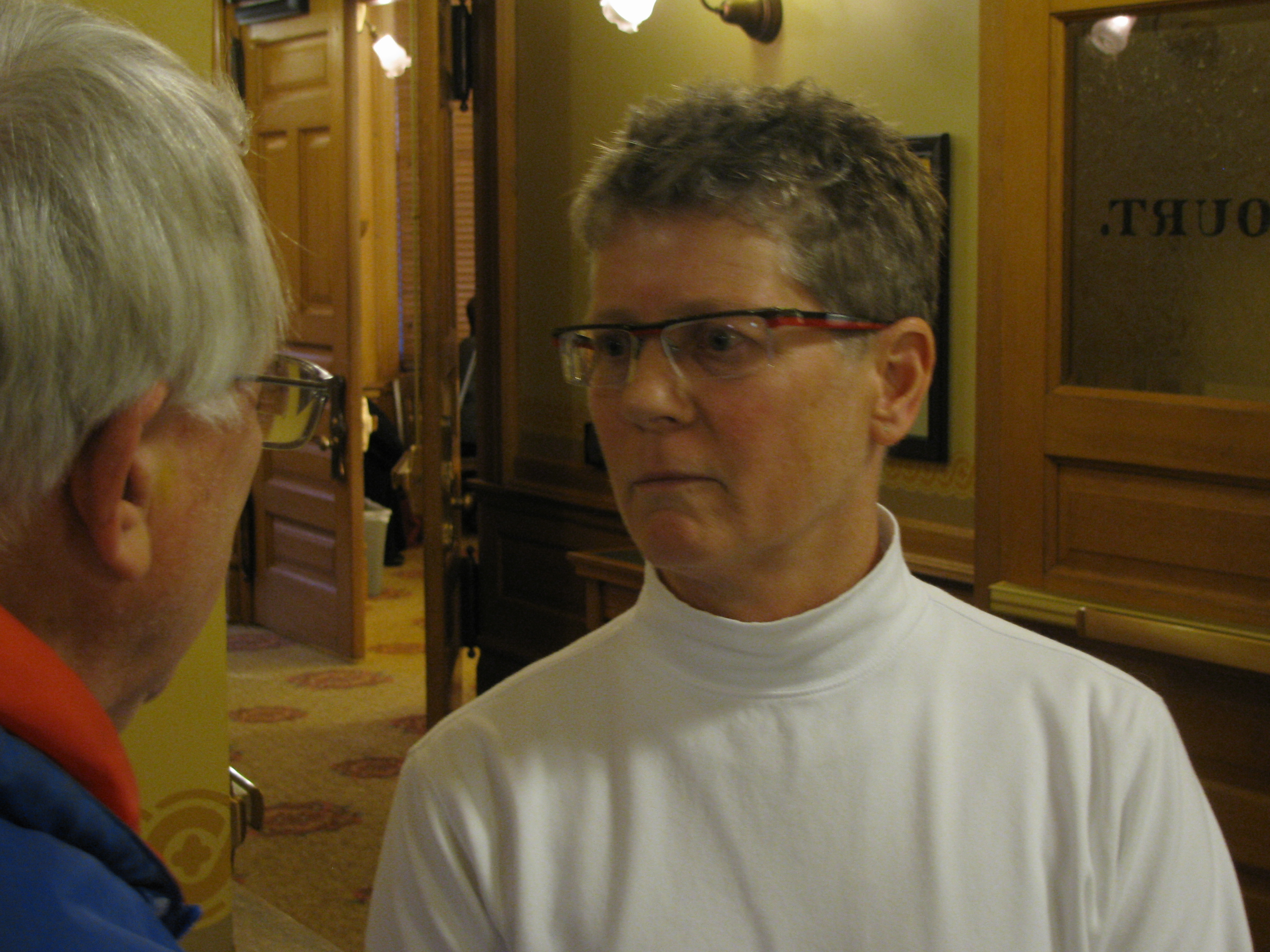Brownback administration supports bill that critics say could invalidate Lawrence anti-discrimination ordinance

Lori Wagner, of Lawrence, outside committee room after testifying Tuesday against House Bill 2260, which she said would allow legal challenges to local laws, such as the one in Lawrence, that ban discrimination against gay, lesbian, bisexual and transgender people. The House Judiciary Committee took no immediate action on the measure.
Topeka ? Gov. Sam Brownback’s administration on Tuesday supported a bill that it said would protect religious liberty, but critics said the measure would allow discrimination against people based on sexual orientation.
Lori Wagner, of Lawrence, said House Bill 2260 would allow people to claim religious reasons for challenging a Lawrence ordinance that bars discrimination against gay, lesbian, bisexual and transgender persons.
“It would legalize discrimination,” Wagner said. “If the underlying goal is to go after gay people, we’re not going to have it.”
But Lt. Gov. Jeff Colyer testified in support of the bill, saying it was needed because President Barack Obama was attacking religious rights. He cited the recent controversy over the Obama administration’s decision to require contraceptive coverage in health insurance plans, which has been criticized by some Catholic leaders.
“As you consider House Bill 2260, the federal government’s recent attempts to trample the religious liberties of millions of Americans must be at the forefront of your debate,” Colyer said. “Religious liberty is at the heart of who we are as a people.”
HB 2260 would prohibit government from substantially burdening a person’s exercise of religion unless the government can prove the action is furthering a compelling government interest. The bill would allow individuals to sue the government if their exercise of religion “has been burdened, or is likely to be burdened.”
The measure, by state Rep. Lance Kinzer, R-Olathe, was considered before Kinzer’s House Judiciary Committee. No immediate action was taken on the bill, which has been dubbed the Kansas Preservation of Religious Freedom Act.
In addition to Colyer, the proposal was supported by the Kansas Catholic Conference, Kansas Family Council, Concerned Women for America of Kansas, and the Alliance Defense Fund.
Michael Schuttloffel, executive director of the Kansas Catholic Conference, said the legislation was “necessary as a bulwark” against the erosion of religious freedoms. “Increasingly, freedom of religion is being reduced and confined to little more than the freedom to worship in a private setting,” he said.
Supporters said the measure was similar to a federal law already in place and wouldn’t violate anyone’s rights.
But state Sen. Marci Francisco, D-Lawrence, spoke against the measure, and Lawrence Mayor Aron Cromwell submitted testimony against it too.
“If a community is concerned that discrimination exists, that community should have some flexibility in addressing those concerns,” Francisco said. “I do not believe that our Kansas statutes should be used to condone discrimination on the basis of an individual exercising their freedom of religion.”
Cromwell said the bill’s definition of “compelling government interest” excludes local law banning discrimination in employment, public accommodations and housing that differ from the Kansas Act Against Discrimination law.
“Lawrence’s law prohibiting discrimination is broader and more inclusive than the Kansas Act Against Discrimination. Our laws were enacted after much public comment and thoughtful deliberation by our elected officials,” he said.
Thomas Witt, executive director of the Kansas Equality Coalition, said the bill would invalidate all nondiscrimination policies that do not exactly match the Kansas Act Against Discrimination. Many schools, universities, cities and counties have policies that specifically prohibit discrimination based on sexual orientation and gender identity, which goes beyond the KAAD, he said.
“Our cities, counties, education institutions, and other agencies have adopted these ordinances and policies in good faith, and out of a desire to make our communities better places to live,” Witt said.
“The last thing they expect from their Legislature is to have this time-bomb dropped in their laps,” he said.
Other groups opposed to the bill were the ACLU of Kansas and Western Missouri, the Kansas chapter of the National Organization for Women and the Great Plains Chapter of Americans United for Separation of Church and State.
The same bill was considered last year but didn’t advance through the Legislature. During last year’s debate, the supporters of the bill talked mostly about protecting the rights of people who opposed same-sex marriage. This time, however, many of the supporters focused on health care mandates from the Obama administration.







